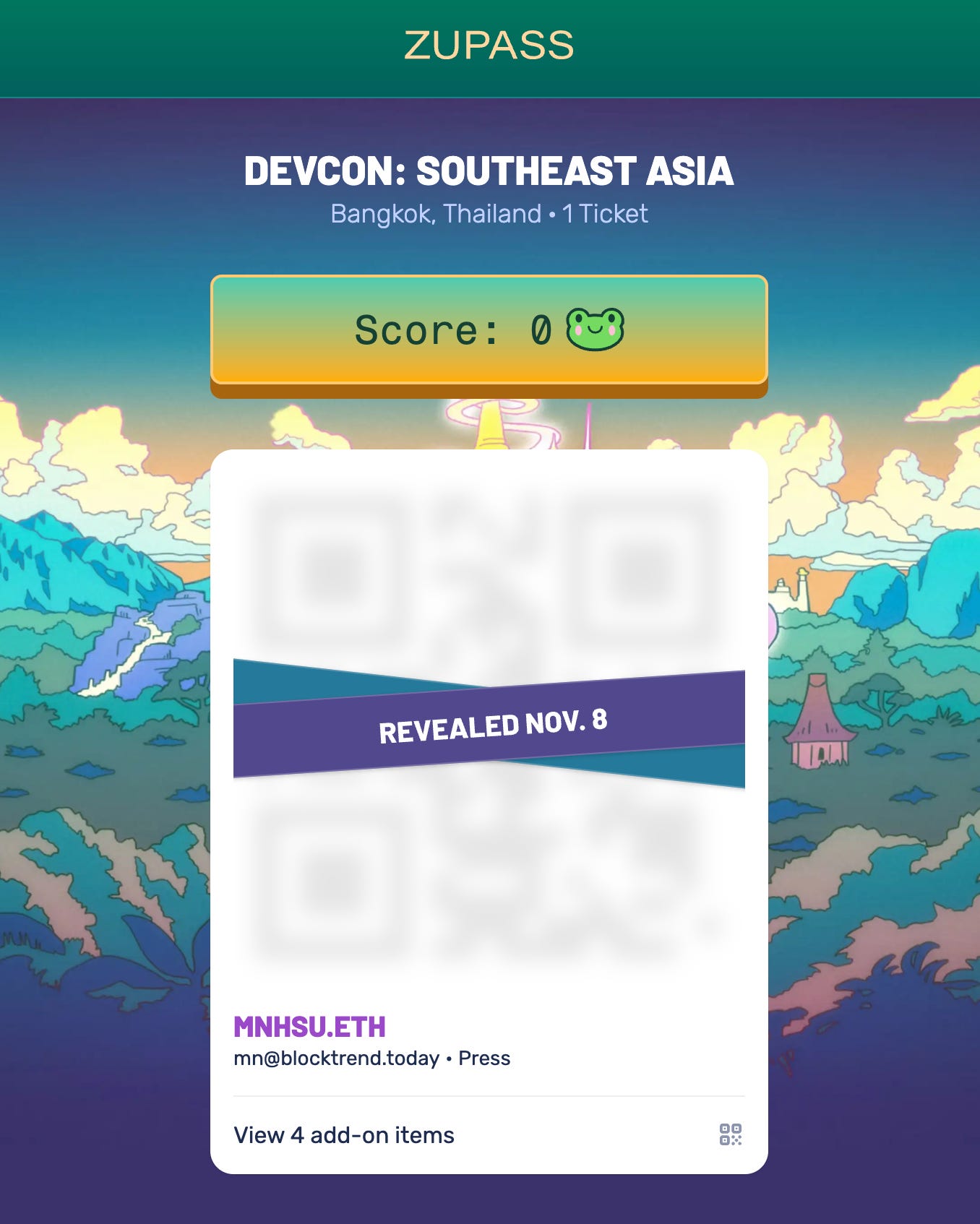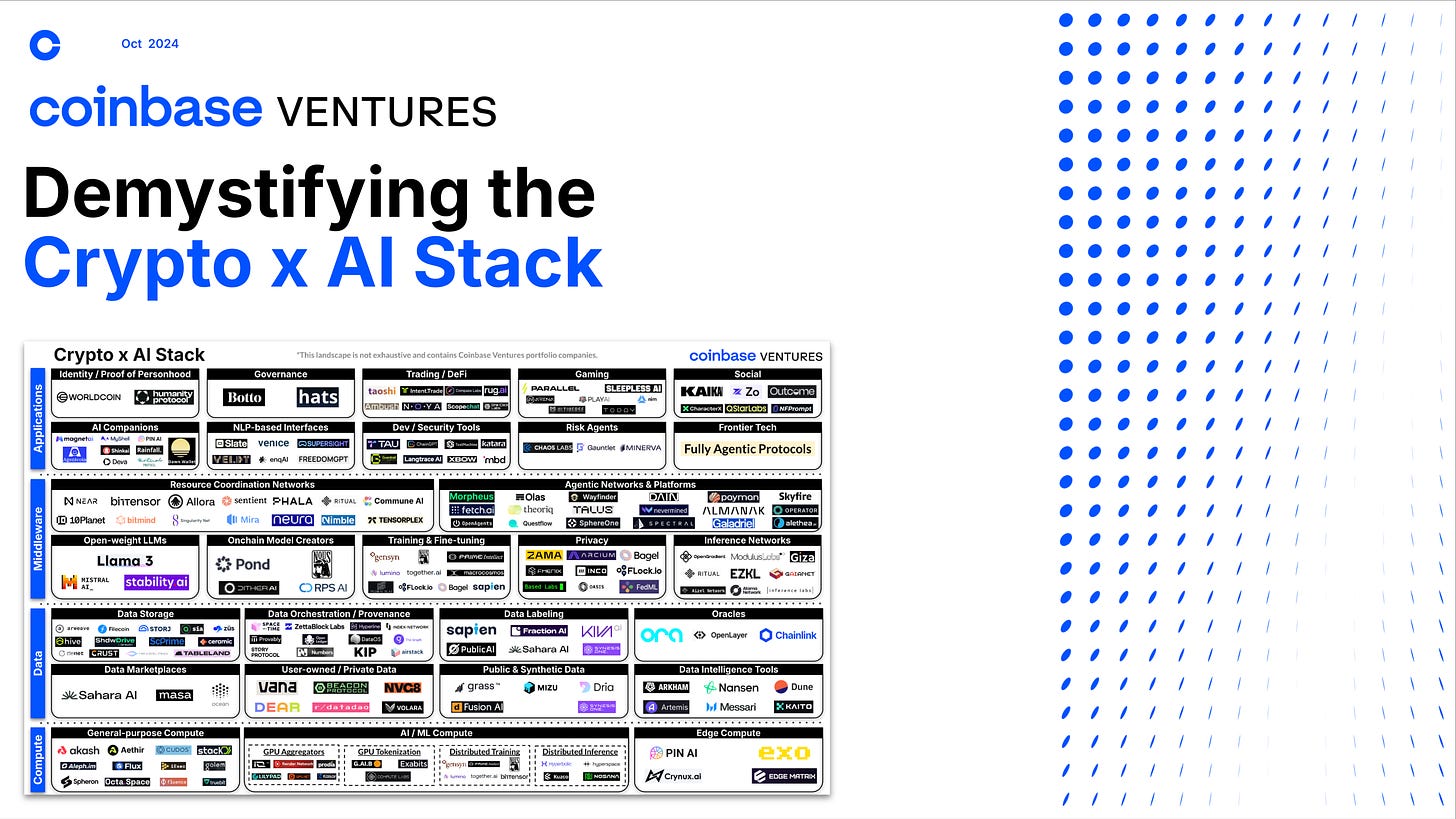GM,
Last week, I mentioned in an article that Ethereum’s Devcon ticket verification surprisingly didn’t use zero-knowledge proofs to protect user privacy1. Well, over the weekend, I received a notification from the event organizers, letting me know that this year’s Devcon will actually be using Zupass, an app that integrates zero-knowledge proof technology. By simply showing the QR code below, it achieves that “you know who I am, but you don’t know who I am2” magic. I’ll record a video to share the process and practical effects later on. Now, let’s dive into the main topic.
In recent years, many have explored the applications of AI and cryptocurrency together, with data sites like CoinMarketCap even introducing categories for AI-related tokens. However, Coinbase creating a dedicated wallet for AI is the latest development that truly caught my attention. Unlike AI-themed coins, Coinbase isn’t claiming “this coin” as the future but rather envisions how AI will interact with humans in the future and builds the necessary tools accordingly. Let’s take a closer look at what this AI-specific wallet from Coinbase actually looks like!
Transactions Between AIs
Below is the first glimpse of this AI wallet. Readers hoping for a brand-new design may be disappointed; only humans require graphical interfaces for assistance. The AI-specific wallet is simply handled with a few lines of code:
npm install @coinbase/coinbase-sdk
import { Coinbase, Wallet } from "@coinbase/coinbase-sdk"; // Use CDP SDKIn August, Coinbase CEO Brian Armstrong announced that the Coinbase Developer Platform witnessed its first cryptocurrency transaction between two AIs, facilitated by this AI-specific wallet.
You may wonder, what would one AI buy from another? The answer is tokens. But here, tokens aren’t cryptocurrency—they refer to the token units generated in AI computation. While AI agents can’t open bank accounts, they can create cryptocurrency wallets. Now, AI bots can use USDC on the Base platform to transact with humans, businesses, or other AIs. These transactions are instant, global, and free.
Unfortunately, the post didn’t include background or specific transaction details, so we don’t know why the AI bot spent money on tokens, what currency was used, through which blockchain, or with which company. However, Brian seems to imply that with wallets, AIs could autonomously procure necessary tools or services via cryptocurrency in the future, aiding humans in completing complex tasks.
Coinbase’s recent announcement of an AI-specific wallet has shed more light on what’s possible once AI has its own wallet. Below is an example of Coinbase’s AI feedback tool, where this AI bot is in training, requiring human input to define what is “good” and what constitutes “beauty.”
Clicking on any image provides feedback, and the AI bot immediately sends ETH to your account. Even without a wallet, users can quickly create one through Coinbase’s smart wallet, and within seconds, ETH is deposited with a celebratory confetti animation. This transaction can also be tracked on a blockchain explorer as “payment” from the AI bot. Refresh the page, and the AI bot will suggest other tasks for you.
Traditionally, AI companies like OpenAI needed to hire many workers to label data. But Coinbase has demonstrated that once AI has a wallet, it can independently recruit online users to assist its learning process and even pay them. This type of self-sufficient AI is known as an AI agent.
AI Agents
According to Bloomberg, OpenAI has classified AI development into five levels:
Chatbots: Capable of natural conversation
Reasoners: Able to solve problems like humans
Agents: Able to take specific actions, particularly by using tools
Innovators: Assisting humans in inventing new things
Organizations: Supporting humans in organizing tasks
OpenAI currently considers itself at Level 1 but is close to Level 2. While AI can plan a trip to Thailand for me, it can’t yet book flights or hotels online. After viewing its travel recommendations, I still need to handle the bookings. For AI to take care of everything for me, it would need to reach Level 3.
Coinbase has anticipated this progression, creating a specialized wallet for AI bots. Last week, Coinbase Ventures published a post suggesting that AI agents will be the central players in future economic activity, encouraging businesses to prepare by designing “shopping carts” for AI bots. When the day arrives that AI can shop independently, businesses will be ready to open their doors to this new type of customer.
It’s almost like a scene straight out of Black Mirror. But thinking about my experience with the AI search engine Perplexity suddenly made me understand what it would look like for AI to shop for people.
For example, if I want to know the cost of setting up a blockchain node, Google will only pull up a list of articles on setting up a blockchain node. I’d then have to browse each article to see if it answers my question. With luck, I might find it, but I could also go through several pages and still come up empty-handed. Perplexity’s AI search, however, reads all the articles and tells me the answer directly, citing the sources.
AI agents would be more like the experience of using Perplexity. In the future, people might not need to “browse online stores” anymore—they could simply tell AI that they want a light jacket for fall, and the AI would search through stores like Uniqlo, NET, or Zara, finding a selection of jackets and recommending the one that fits best, all while completing the checkout.
Do you think this will be our future? I’m not entirely convinced. There will definitely be those who seek efficiency and don’t want to waste time shopping. But some will likely argue that the main enjoyment of online shopping isn’t just the buying but the browsing itself and the unexpected discoveries. In any case, enabling AI to shop would require a lot of preparation, so it’s not something that will happen overnight.
Having a wallet isn’t enough for AI agents; stores would also need to develop shopping interfaces tailored to AI bots. Otherwise, CAPTCHA might block the bots. But the biggest question is: how will merchants handle payment from AI agents?
Legal Currency for Robots
Blocktrend once discussed the news of Stripe enabling merchants to accept cryptocurrency payments3. At the time, the most challenging question was who actually needs to pay with cryptocurrency. I used Nigerian consumers as an example to illustrate that this need exists in certain countries. However, many readers in Taiwan might think, "I’m not Nigerian; what does this have to do with me?" Now, there’s a more compelling answer—cryptocurrency may essentially serve as “legal tender” for AI agents that cannot open traditional bank accounts.
When AI uses cryptocurrency to make payments, it doesn’t mean that merchants are limited to receiving crypto alone. Using Bridge’s exchange services4, businesses can convert crypto into designated fiat currencies, which are then deposited into their bank accounts. Coinbase’s development of an AI-specific wallet now seems like preparation for a new wave of consumers, a group of “entities” excluded from traditional financial systems.
Recently, I saw a quote from Vitalik Buterin on the Devcon website:
"The difference between Argentina and some of the wealthier countries is that in wealthier places, there are people who are excited about crypto ideas and theory, but people here deeply understand that crypto is solving real problems." — Vitalik Buterin
I believe this perspective also applies to AI agents. Cryptocurrency is the internet’s native money, but humans still don't fully live within the online realm. It’s no wonder that only those in countries and regions excluded from the global financial system feel a direct connection to cryptocurrency. AI, however, is truly native to the internet, and if it is to participate in financial systems in the foreseeable future, it may have no alternative but cryptocurrency.
Blocktrend is an independent media platform sustained by reader subscription fees. If you find Blocktrend's articles valuable, we welcome you to share this piece. You can also join discussions on our member-created Discord or collect the Writing NFT to include this article in your Web3 records.
Furthermore, please consider recommending Blocktrend to your friends and family. If you successfully refer a friend who subscribes, you'll receive a complimentary one-month extension of your membership. You can find past issues in the article list. As readers often inquire about referral codes, I have compiled them on a dedicated page for your convenience. Feel free to make use of them.






